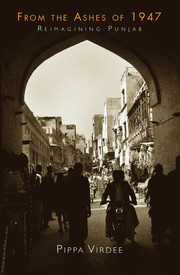Book contents
- Frontmatter
- Contents
- List of Photographs
- List of Maps and Tables
- List of Excerpts
- List of Abbreviations
- Glossary
- Acknowledgements
- Preface: Memories Create History
- 1 Partitioned Lands, Partitioned Histories
- 2 The Treasure within the Five Rivers
- 3 Handing Over the Reigns
- 4 Violence, Migration and the Making of the Refugee
- 5 Sacred Malerkotla
- 6 Migrating to the Promised Land: A Tale of Two Cities
- 7 From Refugee to Citizen
- 8 Cleansing Hearts and Minds
- 9 Lost Innocence and Sold Honour
- 10 Dreams, Memories and Legacies
- Select Bibliography
- Index
Preface: Memories Create History
Published online by Cambridge University Press: 05 July 2018
- Frontmatter
- Contents
- List of Photographs
- List of Maps and Tables
- List of Excerpts
- List of Abbreviations
- Glossary
- Acknowledgements
- Preface: Memories Create History
- 1 Partitioned Lands, Partitioned Histories
- 2 The Treasure within the Five Rivers
- 3 Handing Over the Reigns
- 4 Violence, Migration and the Making of the Refugee
- 5 Sacred Malerkotla
- 6 Migrating to the Promised Land: A Tale of Two Cities
- 7 From Refugee to Citizen
- 8 Cleansing Hearts and Minds
- 9 Lost Innocence and Sold Honour
- 10 Dreams, Memories and Legacies
- Select Bibliography
- Index
Summary
It is 5 December 2013 and I have just attended a lecture by Rajmohan Gandhi, grandson of Mahatma Gandhi, at Foreman Christian College, Lahore. He was giving a talk on Khan Ghaffar Badshah Khan, the great leader from the Frontier. At the same time, Gandhi was also launching his book Punjab: A History from Aurangzeb to Mountbatten. All these fragmented pieces are brought together later in the day while I am attending a dinner for Rajmohan Gandhi and I sat there chatting with Najum Latif, talking about Indian nationalism, the twonation theory and Punjabi nationalism. We were meeting after many years; the first meeting was at Government College Lahore while I was doing my PhD on the partition of India. We are conversing in Punjabi and through his stories he takes me back to the days of his childhood in pre-partitioned Punjab, more specifically in Jullundur, where his ancestral roots are. He laments about the state of Punjab and why it should never have been partitioned; he is one of the few survivors of that generation that witnessed this great calamity himself as a child. Uprooted, unsettled, traumatised and ultimately disappointed in outcomes. No politician asked people like him or that generation whether they wanted a divided land. Instead, they were sold dreams, aspirations and division.
Ten years after completing my PhD thesis, I revisit my own work that was never published in its entirety. After visiting Lahore at the end of 2013, I felt that it is even more relevant today. There is a need for many to understand why this happened, though the answers may never be truly known. Many friends and colleagues were still discussing and debating the events of 1947. I also noticed that there seems to be a great deal of interest in partition and what happened in Punjab among many people.
- Type
- Chapter
- Information
- From the Ashes of 1947Reimagining Punjab, pp. xvii - 1Publisher: Cambridge University PressPrint publication year: 2017



